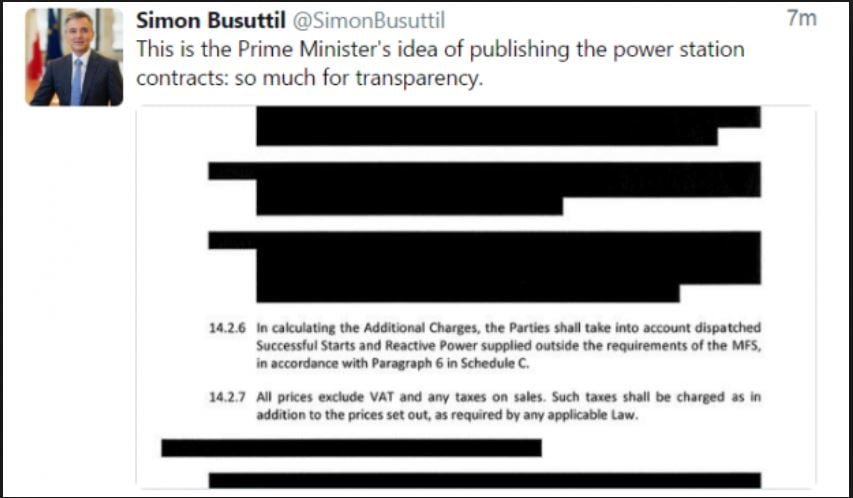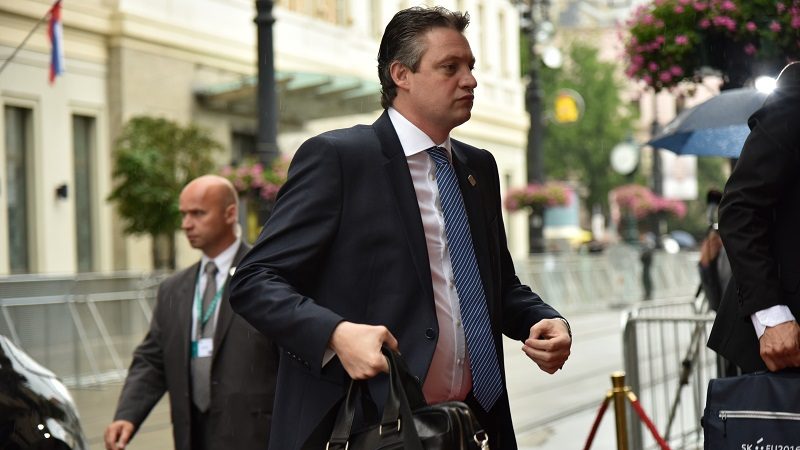“So how much are we paying for that?”
“Sorry man, I can’t tell you.”
“What do you mean, you can’t tell me? We’re business partners. I’m paying for it, too.”
“It’s commercially sensitive. You’ll just have to trust me.”
No one in their right mind would accept such nonsense from anyone they do business with.
But what if this happened in government?
What if the party in power said something like this to the Opposition?
All Members of Parliament are elected to represent the people. It doesn’t matter which side of the floor they sit on, they should be fully informed about what’s happening in the government of which they collectively form a part.
Of course, that’s not how things work in the parallel universe that is the island of Malta.
In Malta, the government of Joseph Muscat signs shady deals with sometimes unknown foreign parties, deals that involve major public assets like hospitals and power stations, and that commit the people of Malta to unknown payments which extend into future unknown timelines.
But they don’t just sign these deals, they refuse to table them in parliament.
When pressed to inform the rest of the House what they’ve committed to in the people’s name, Muscat’s ministers — eventually, reluctantly, months later — present the rest of the government with contracts so heavily redacted in black that you’d think they were getting kickbacks on ink.

I couldn’t imagine anything like this happening in Canada.
I worked for the House of Commons one summer after I graduated university. I was editing Parliamentary Committee evidence. It was a boring job much of the time, but I came away with a very clear sense of how my government operated.
Here’s how it works in a normal, functioning democracy that is based on the British parliamentary system.
When an election happens in Canada, the Party with the most seats is asked to form the government, and the leader of that Party becomes the Prime Minister. The Party in power also gets to set the agenda for the Government of Canada during its term in office.
Elections to the House of Representatives in Malta is based on the single transferable vote system – when a party achieves 50%+1 of first-preference valid votes in the election but does not secure a Parliamentary majority, it is awarded enough seats to make a Parliamentary majority. The Party in power also gets to set the agenda for the Government of Malta during its term in office.
In Canada, the Party in power is answerable to parliament. The Opposition’s job is to play devil’s advocate — they ask questions, they challenge the government’s decisions, they criticise, and they demand accountability from power. None of these things is considered “an attack on” anyone. It’s the Opposition’s proper role.
Much of the actual work of government is done in Parliamentary Committees. That’s where expert witnesses are heard, policies are discussed, and new legislation is argued over and amended. Each Parliamentary Committee is made up of Members of Parliament from all parties in the House of Commons. That’s right — both government MPs and opposition MPs work together to create policies that benefit the people.
It would be completely unfathomable for the Party in power to show up with a contract and say, “By the way, we sold the country’s power station to foreign investors. And we committed to buying fuel for set prices for the next 20 years from a formerly Soviet Third World dictatorship. Oh, and the government is guaranteeing a massive loan for the entire thing. But we can’t show you the contract, even though we signed it in your name.”
I can’t think of anything to compare this with, except maybe, “We’re in charge and you can’t make us, nyah nyah nyah.”
It’s like being back in kindergarten.
The most common excuse I’ve heard for this childish deadlock involves Malta being some sort of special case: “Malta is a two-Party system where one Party always dominates, so it doesn’t work the same way here.”
Nonsense.
For as long as it has been a country, power in Canada has alternated between the Liberal Party and the Conservative Party, with a small number of seats won by a third party, the socialist NDP.
In Canada, the system functions. In Malta, that system has been completely hijacked by the Party in power.
The Labour Party’s inner circle is selling your national assets, signing away your future, and committing your and your children’s generation to unknown payments.
They’re refusing to tell the rest of the government — the parliamentary opposition — what they’ve agreed to in the people’s name. And certain individuals are taking nice cuts for themselves while doing it.
The next time you get confused about the issue, I suggest you think of it like this.
Your husband has just signed a contract. He sold your family home to someone — you don’t know who. He refuses to tell you the price. He’s committed you to turning it into a gilded mansion at your own expense before you hand it over. And you’ll also have to pay the property taxes and utilities bills for years after you move out.
When you ask to see the agreement that your name is on, and that you’re also legally responsible for, his answer is, “Sorry dear, commercially sensitive. You’ll just have to trust me.”












